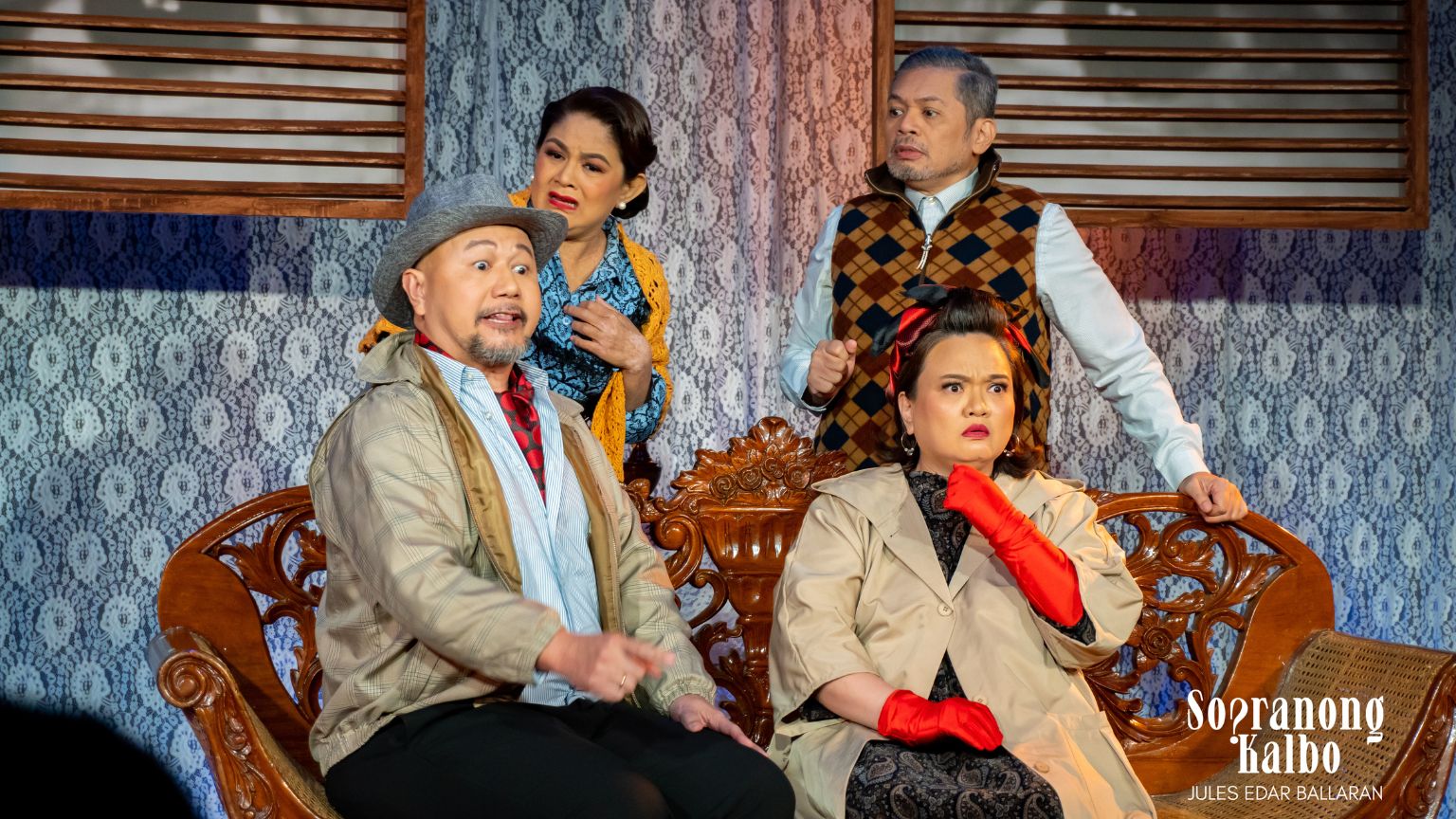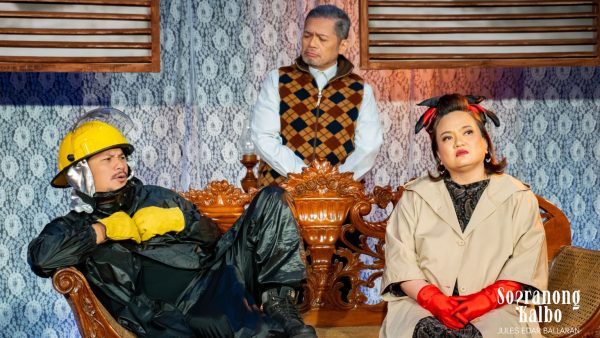
REVIEW: The Art of Absurdity in ‘Sopranong Kalbo’
“In Sopranong Kalbo, nonsense and humor reveal the fragile, often meaningless routines that shape human existence.”
In Sopranong Kalbo, nonsense is king, and it rules with unexpected grace. While absurd theater often feels impenetrable, Eugène Ionesco’s The Bald Soprano– as translated by Rolando Tinio and directed by Ron Capinding as Teatro Meron’s inaugural production–uncovers the futility and humor at the core of human existence. The play satirizes bourgeois life, highlighting its trivial routines and empty social habits, while also portraying the breakdown of communication that exposes the meaninglessness beneath these interactions. The production carries a personal tribute to Capinding’s own mentor, Ricardo Abad. In the backdrop, a massive, close-up image of Abad’s eyes hangs as a silent observer.
The entire play takes place within the confines of the Santos family’s living room. It is unmistakably upper-class Manila: a wooden sofa flanked by two red round chairs, a striking patterned carpet, and a single lamp perched on a console table behind the sofa. This domestic realism is immediately disrupted by the characters’ costumes—a farcical clash of styles that includes coats, vests, odd-patterned ties, red gloves, hats, and a wild hairdo. Only Marie, the maid, and the fire chief wear uniforms that make sense, but even those seem to be infected by the play’s growing absurdity. The physical environment feels grounded, yet the people inhabiting it are out of sync with any recognisable reality, setting the stage for the nonsense to come.
Conversations to Nowhere and Everywhere
The stage greets us with Ginang Santos (Miren Alvarez-Fabregas) knitting on the sofa while Ginoong Santos (Joel Macaventa) smokes his pipe and reads a newspaper from one of the side chairs. From here, there is no story. Ginang Santos opens with an oddly detached remark about dinner, her words strung in unusual Filipino sentence structures, peppered with mutated terms. Her thoughts are also scattered—jumping from dinner to her children, to foods like sopas, sugar, or yogurt. In keeping with this, Ginoong Santos replies, not with words, but with a steady, rhythmic tongue click.
The conversation continues to meander into the trivial: the life of a man named Bobby Tuazon, a case of a doctor’s surgery, and other domestic non-events. These topics are prolonged as if to kill time, yet they reveal the absurdity of a life so cushioned by privilege that there is nothing urgent to discuss. Their sentences twist unnaturally, and replies often have no logical connection to the statements that prompted them.
When Ginoong Martin (Joseph Dela Cruz) and Ginang Martin (Pickles Leonidas) arrive, the verbal incoherence doubles. They converse while moving with odd, dance-like precision. As the two couples share the living room, their conversations often spiral away from any apparent point. A ringing doorbell, for instance, leads to a drawn-out debate over whether there is actually someone at the door. At other times, their dialogue trails off entirely, replaced by long, uneasy silences. In these moments, the couples fix their gazes on the clock, on each other, or into empty space, revealing a profound emptiness where meaningful dialogue simply does not exist.
No Logic Allowed

L-R: Yan Yuzon, Joel Macaventa, Pickles Leonidas; Photo Credit: Jules Edar Ballaran
Logic itself seems to take a backseat in this world. Marie, the maid (Gold Soon), defies every expectation of her role. Like the others, she speaks in absurd, nonsensical lines, but delivers them with surprising authority. Her confidence peaks when, out of nowhere, she announces that her real name is Sherlock Holmes. Meanwhile, Hepe ng Bombero (Yan Yuzon) turns reality upside down by treating minor kitchen stove flare-ups as urgent emergencies while dismissing major petroleum fires as insignificant. The play’s refusal to acknowledge consistent logic becomes its own brand of truth.
Time becomes just as unreliable as the characters’ speech and logic. Each prolonged conversation about trivial matters or each pause in silence is punctuated by the ticking and chiming clock. However, these time cues do not follow a logical sequence. The characters count the bell chimes on their fingers, yet the hours jump unpredictably. Even the days of the week are jumbled, with “Huwebes” (Thursday) and “Martes” (Tuesday) repeated out of order. This tops off during a scene when the couple invites the fire chief to stay with them and share more stories. At this moment, Ginoong Santos proudly declares, “Walang oras dito!” (“There is no time here!”). His announcement captures the complete collapse of chronological order in the play and deepens its overall sense of absurdity.
Making Absurdity Work

From Top, L-R: Yan Yuzon, Gold Soon, Joel Macaventa, Miren Alvarez-Fabregas; Photo Credit: Jules Edar Ballaran
One of the play’s greatest strengths lies in its cohesiveness. Every element works together to create a unified experience of absurdity where normal rules no longer apply. The humor arises not from punchlines but from the characters’ behaviors, such as their peculiar movements and sudden bursts of emotions.
Alvarez-Fabregas infuses Ginang Santos with enthusiasm, making even her laughter genuinely contagious. Her expressive facial cues perfectly complement her clear and precise delivery. Macaventa’s measured pacing and subtle reactions give weight to the smallest gestures—from tongue clicks and eye rolls to well-timed pauses. Dela Cruz and Leonidas shape the Martins into a rhythmic pair. Their ability to maintain deadpan expressions while performing eccentric physicality is a key source of their humor, with Leonidas’s playful sassiness further defining her role.
Soon’s Marie dominates the stage with a blend of playful mischief and commanding presence, while Yuzon’s Hepe ng Bombero presents illogical reasoning with the earnestness reminiscent of a petulant youth, making his performance doubly humorous. Even with appearances limited to certain scenes, they deliver distinctive and memorable performances that draw the audience into the play’s strange, comic world.
The play’s absurdity escalates from simple nonsense exchanges to direct audience engagement, sudden bursts of movement like repeated cheering, a train dance, and rapid-fire exchanges of illogical one-liners. It ends brilliantly with a final portrayal of complete language breakdown, where no recognizable words remain, leaving the audience doubled over in laughter. If time has no meaning, then there’s no better way to kill it than with Sopranong Kalbo.
Tickets: PHP 700, PHP 720, PHP 800
Show Dates: August 8-10, 2025
Venue: Rizal Mini Theater, Ateneo de Manila University
Running Time: approximately 1 hour and 40 minutes (no intermission)
Company: Teatro Meron and Roleplayers Inc
Creatives: Eugène Ionesco (Playwright), Ron Capinding (Director), Rolando Tinio (Translator), Tata Tuviera (Production Designer), Ara Fernando (Make-up Designer), Zak Joaquin Capinding (Sound Designer), D Cortezano (Lighting Designer), EJ Ramos (Assistant Lighting Designer), Jo Aguilar (Graphic Designer), and Reamur A. David (Photographer)
Cast: Joel Macaventa, Miren Alvarez-Fabregas, Joseph Dela Cruz, Pickles Leonidas, Gold Soon, Yan Yuzon


Comments